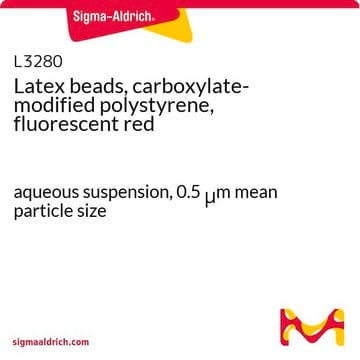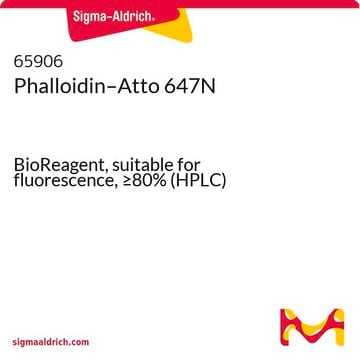79286
Phalloidin–Atto 700
suitable for fluorescence, ≥90% (HPLC)
Sinónimos:
Atto 700–Phalloidin
Iniciar sesiónpara Ver la Fijación de precios por contrato y de la organización
About This Item
UNSPSC Code:
12352116
NACRES:
NA.32
Productos recomendados
assay
≥90% (HPLC)
form
powder
manufacturer/tradename
ATTO-TEC GmbH
transmittance
254 nm
700 nm
fluorescence
λex 700 nm; λem 719 nm in 0.1 M phosphate pH 7.0
λ
in methanol
suitability
suitable for fluorescence
storage temp.
−20°C
General description
Atto 700 belongs to a new generation of fluorescent labels. The dye is designed for application in the area of life science, e.g. labeling of DNA, RNA or proteins. Characteristic features of the label are strong absorption, high fluorescence quantum yield, excellent thermal and photo-stability, very good water solubility and very little triplet formation. Atto 700 is a zwitterionic dye with a net electrical charge of zero. The fluorescence is efficiently quenched by electron donors like guanine, tryptophan, etc
Phalloidin is a fungal toxin isolated from the poisonous mushroom Amanita phalloides. Its toxicity is attributed to the ability to bind F actin in liver and muscle cells. As a result of binding phalloidin, actin filaments become strongly stabilized. Phalloidin has been found to bind only to polymeric and oligomeric forms of actin, and not to monomeric actin. The dissociation constant of the actin-phalloidin complex has been determined to be on the order of 3 x 10-8. Phalloidin differs from amanitin in rapidity of action; at high dose levels, death of mice or rats occurs within 1 or 2 hours. Fluorescent conjugates of phalloidin are used to label actin filaments for histological applications. Some structural features of phalloidin are required for the binding to actin. However, the side chain of amino acid 7 (g-d-dihydroxyleucine) is accessible for chemical modifications without appreciable loss of affinity for actin.
find more information here
Phalloidin is a fungal toxin isolated from the poisonous mushroom Amanita phalloides. Its toxicity is attributed to the ability to bind F actin in liver and muscle cells. As a result of binding phalloidin, actin filaments become strongly stabilized. Phalloidin has been found to bind only to polymeric and oligomeric forms of actin, and not to monomeric actin. The dissociation constant of the actin-phalloidin complex has been determined to be on the order of 3 x 10-8. Phalloidin differs from amanitin in rapidity of action; at high dose levels, death of mice or rats occurs within 1 or 2 hours. Fluorescent conjugates of phalloidin are used to label actin filaments for histological applications. Some structural features of phalloidin are required for the binding to actin. However, the side chain of amino acid 7 (g-d-dihydroxyleucine) is accessible for chemical modifications without appreciable loss of affinity for actin.
find more information here
Packaging
Bottomless glass bottle. Contents are inside inserted fused cone.
Legal Information
This product is for Research use only. In case of intended commercialization, please contact the IP-holder (ATTO-TEC GmbH, Germany) for licensing.
Storage Class
11 - Combustible Solids
wgk_germany
WGK 3
Certificados de análisis (COA)
Busque Certificados de análisis (COA) introduciendo el número de lote del producto. Los números de lote se encuentran en la etiqueta del producto después de las palabras «Lot» o «Batch»
¿Ya tiene este producto?
Encuentre la documentación para los productos que ha comprado recientemente en la Biblioteca de documentos.
David Ochoa et al.
Molecular systems biology, 12(12), 888-888 (2016-12-03)
The coordinated regulation of protein kinases is a rapid mechanism that integrates diverse cues and swiftly determines appropriate cellular responses. However, our understanding of cellular decision-making has been limited by the small number of simultaneously monitored phospho-regulatory events. Here, we
Nuestro equipo de científicos tiene experiencia en todas las áreas de investigación: Ciencias de la vida, Ciencia de los materiales, Síntesis química, Cromatografía, Analítica y muchas otras.
Póngase en contacto con el Servicio técnico


